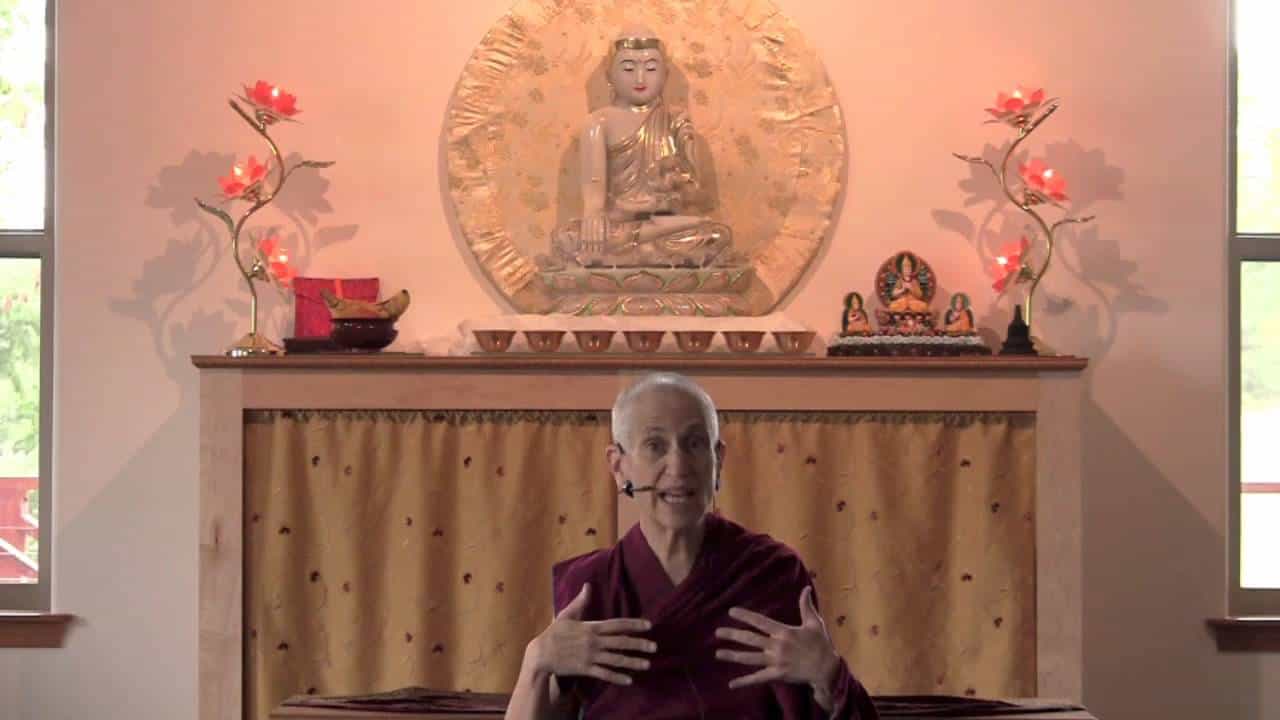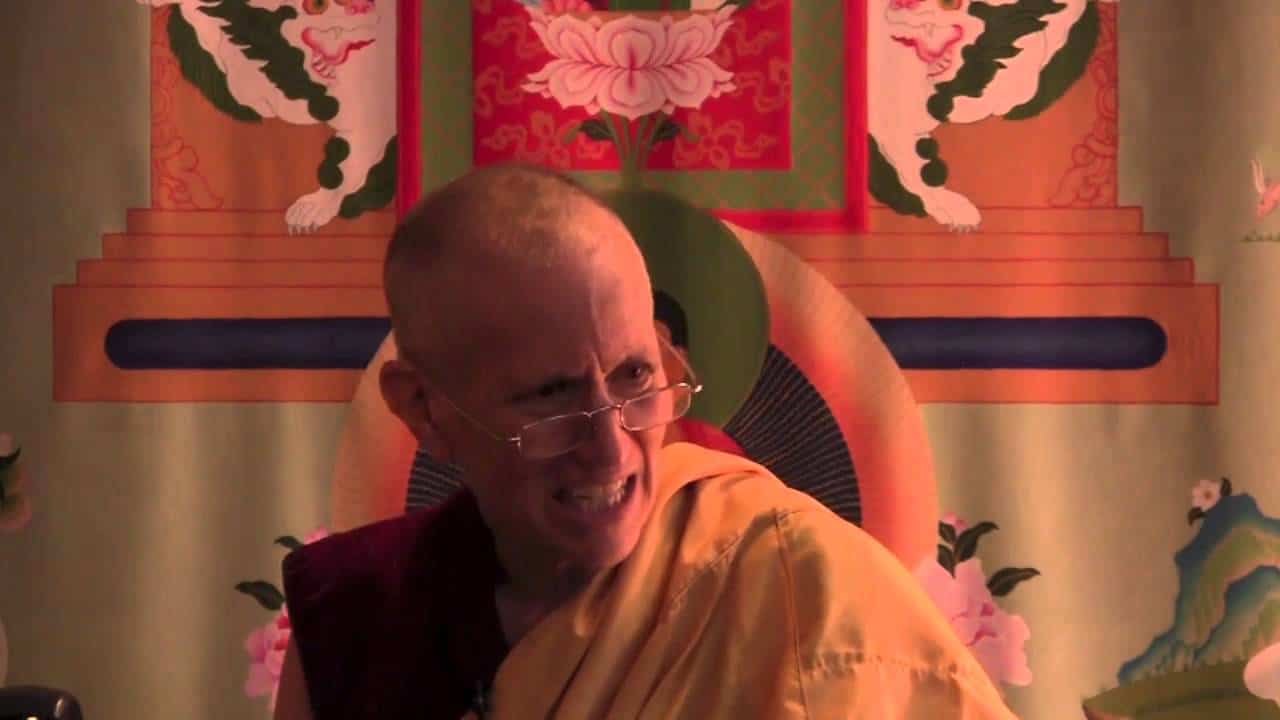Verse 81: The flying horse
Part of a series of talks on Gems of Wisdom, a poem by the Seventh Dalai Lama.
- The value of a precious human life
- Looking at how most people spend their human lives
- Importance of deeply considering the meaning and purpose of our lives
- Considering the causes of a precious human life
Gems of Wisdom: Verse 81 (download)
“What is like the flying horse well worth the trouble of seeking it?”
[laughter] “The flying elephant!” “The flying nun!” [laughter]
It’s some kind of mythological animal in Tibetan culture that indicates auspiciousness and fulfillment of your wishes, okay?
The answer is: “The status of a human being endowed with strength and power.”
What is like the flying horse well worth the trouble of seeking it?
The status of a human being endowed with strength and power.
In other words, somebody having a precious human life.
Not just every human life is a precious human life. That’s why it was a “human life with strength and power.” Because that indicates the eight freedoms and the 10 fortunes.
We have to be really clear. Because just having a human life alone isn’t sufficient. If you look around, most people how do they use their human lives? Pleasing your friends, harming your enemies. Getting as much pleasure as you can. Not thinking about death and impermanence. Knowing nothing about how karma and its effects function. Yes? I mean, when you look at most of the world there are some rudimentary ethical standards that many people don’t even adhere to, and deliberately and happily break. And then those who do have kind hearts, still don’t see…. Most people don’t think past this life. When you don’t think past this life then acting with attachment doesn’t seem to have any drawbacks. Because so often when you have attachment in the mind, then you’re happy. So people think yes, why not be happy? And they don’t see that attachment leads to pain afterwards. And so do a lot of things out of attachment to money and possessions, and people and so on, without thinking of the karmic consequences of those kinds of activities.
Just having a human life is not sufficient to have something that is like a “flying horse” that is very rare and precious and auspicious and can lead you to fulfill your desires. Okay? Because most human beings, fulfillment of desires…. Most people, our desires are frustrated. Aren’t they? When you think about this, we don’t get everything we want. But when our desires go towards creating good karma, towards liberation, towards full awakening, towards transforming the mind, and so on, then those desires can be fulfilled, and there’s something that we can do about it that doesn’t always depend on the external situation. So that gives us a lot of freedom to really fulfill what is important for us in our minds.
For that reason it’s important to recognize that we have a precious human life, and to really think about its meaning and purpose. And to really compare just a regular human life with a precious human life. What’s the meaning and purpose of a regular human life, according to the people who have one? What’s the meaning and purpose of a precious human life, according to the people who have one?
We often think that everybody who walks into a Dharma center has a precious human life. No. Look at the eight freedoms very carefully. Look at the 10 fortunes very carefully. Many people walking into a Dharma center, many people born in a Buddhist family, do not have a precious human life. One of the factors is having interest in the Dharma. Or having faith in the law of cause and effect. Having respect for the sangha, and the Three Jewels in general. Many people who walk in a Center, who were born in a Buddhist family, don’t have these things.
We really have to think very carefully, and really ask ourselves if we truly have a precious human life. Do we really? And if we do, what is its meaning and purpose? And how is that different from how other people live? And also to think about the causes of a precious human life. Ethical conduct, just to be born in an upper realm. Practice of the six perfections (the six far-reaching practices) so that you have the material wherewithal to be able to practice. And dedicating our merit and having sincere aspirations. Do we complete those causes in a very appropriate and pure way, or are we kind of sloppy. In other words, we have this opportunity now, but are we using it even to create the cause for another such opportunity like this? And how do we create those causes?
Because what we need to attain for enlightenment—awakening—is a series of precious human lives. Unless you think you’re going to attain awakening this life—which is absolutely the best, but I don’t know about you, I don’t think it’s going to happen this life—so it’s very important to create the karma to be able to have a precious human life in the future.
Really think about that. And what’s interesting when you do the lamrim meditations is the more you think about the rest of the path—especially when you get to topics like the six perfections and buddha nature and emptiness and whatever—for me, it makes me really appreciate precious human life even more. Because if you’re going to gain any experience in those kinds of topics it has to be on the basis of a precious human life. And then it really makes me think “okay, what am I doing with my life? How am I spending my time?” Because my time is really my most important possession. So I don’t want to spend my time doing things that are not going to matter in the long term.
Let our understanding of the latter part of the lamrim affect our understanding of the previous part. And it really helps us, I think. I remember when I first started meditating on precious human life I was thinking of these things and nothing really made very much sense … because I wasn’t so sure at that time whether I believed in other realms, and even if I did, all these other qualities, it was like, “So what?” But then when you really see what it takes from our side to do some of those practices that we admire so much, and have so much reverence for, and practices that we would like to be able to develop, and we see that to do that we have to have certain qualities first and a certain appreciation of our life and our present situation first, then it really kind of wakes us up to what is the meaning of having a precious human life. And not just, “Yeah, I have one, what’s next?”
Because you think … any small change in small circumstances, yes? And our opportunity to practice is gone. I’ve been in the Dharma many years and people I started out with, to see people who were my age, some of them are dead by now. Some of them died very soon after our first meditation course. Then other people started out gung-ho in the Dharma and then they evaporated into corporate lifestyles. It’s just amazing. Having a precious human life is not to be taken for granted, I think even in one lifetime. And so to be very conscientious, very aware, and to appreciate our lives and respect ourselves, because clearly whoever we were in previous lives worked very hard and did a lot of good things. So to get down on ourselves, criticize ourselves, and tell ourselves we’re stupid is ridiculous when we have this kind of resultant rebirth.
Venerable Thubten Chodron
Venerable Chodron emphasizes the practical application of Buddha’s teachings in our daily lives and is especially skilled at explaining them in ways easily understood and practiced by Westerners. She is well known for her warm, humorous, and lucid teachings. She was ordained as a Buddhist nun in 1977 by Kyabje Ling Rinpoche in Dharamsala, India, and in 1986 she received bhikshuni (full) ordination in Taiwan. Read her full bio.


